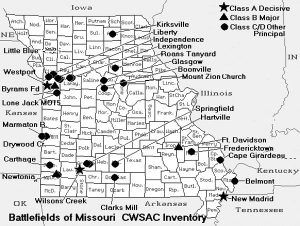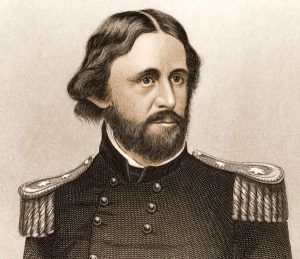The Control Missouri Campaign Battles:
Boonville – June 17, 1861
Carthage – July 5, 1861
Wilson’s Creek – August 10, 1861
Dry Wood Creek – September 2, 1861
Lexington – September 13-20, 1861
Liberty or Blue Mills – September 17
Fredericktown – October 21, 1861
Springfield – 1 – October 25, 1861
Like the three other “border states” of Delaware, Maryland, and Kentucky, Missouri was deemed critical to the Lincoln Administration due to its geographical position and questionable loyalty to the North because it was a “slavery state.” Though Missourians had voted overwhelmingly against secession before the war, their sympathy lay with the South, and they opposed Federal military action against the departing States.
Missouri had attempted neutrality after delegates to a secession convention in February 1861 refused to secede. Afterward, both pro-Union and pro-Confederate governments were established in the state. However, a Federal invasion in May pushed many Unionists into the Confederate camp. As in Kentucky, pro-Union and pro-Confederate governments were established, the latter run in exile by Governor Claiborne F. Jackson.
At the outbreak of the Civil War, Major General John C. Fremont was appointed to lead the Western Department of the Union Army. Based in St. Louis, Missouri, Fremont spent more energy fortifying the city than he did equipping the troops in the field. As a result, his forces suffered several losses, particularly a significant defeat at Wilson’s Creek on August 10, 1861.
After this defeat, Fremont tried to gain a political advantage by making an unauthorized proclamation on August 30 that the State of Missouri would be under martial law, secessionists’ property confiscated, and all slaves owned by Confederates in Missouri were free. Though the action was cheered by antislavery Republicans, Abraham Lincoln was furious as he feared that this action would force slave-owners in border states to join the Confederate forces.
President Abraham Lincoln then asked Fremont to revise the order. Refusing, the general sent his wife to plead the case. Lincoln responded by revoking the proclamation and relieving Fremont of command on November 2, 1861.
But it was too late. Lincoln’s predictions had proved correct. Throughout most of 1861, the Confederate government had been reluctant to support the Missouri state troops because the state had not officially aligned itself with the Confederacy. However, on November 25, 1861, Missouri was officially admitted as the 12th Confederate State.
Compiled and edited by Kathy Alexander/Legends of America, updated June 2023.
Also See:



